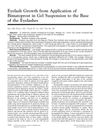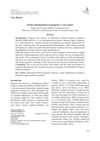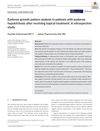 September 2024 in “Journal of Cosmetic Dermatology”
September 2024 in “Journal of Cosmetic Dermatology” Follow these guidelines to safely and effectively use energy-based devices in aesthetic treatments.
 29 citations,
May 2010 in “Ophthalmology”
29 citations,
May 2010 in “Ophthalmology” Bimatoprost gel makes eyelashes grow longer, but may cause side effects and should be monitored by an eye doctor.
 15 citations,
May 2021 in “British journal of dermatology/British journal of dermatology, Supplement”
15 citations,
May 2021 in “British journal of dermatology/British journal of dermatology, Supplement” Cell therapy shows promise for treating severe psoriasis but needs more research to confirm safety and effectiveness.
 94 citations,
January 2007 in “Cutaneous and Ocular Toxicology”
94 citations,
January 2007 in “Cutaneous and Ocular Toxicology” Iranian veterans exposed to sulfur mustard suffer from long-term skin itching and eye damage, with some risk of skin cancer and ongoing management challenges.
 September 2024 in “Journal of Clinical Medicine”
September 2024 in “Journal of Clinical Medicine” Permanent makeup can cause delayed allergic reactions, but they can be managed with proper treatment.
 142 citations,
March 2019 in “Frontiers in Cellular Neuroscience”
142 citations,
March 2019 in “Frontiers in Cellular Neuroscience” The document concludes that adenosine receptor agonists have potential for treating various conditions, but only a few are approved due to challenges like side effects and the need for selective activation.
 September 2024 in “Current Oncology”
September 2024 in “Current Oncology” Docetaxel often causes hair loss, with limited effective treatments and no cure for permanent hair loss.

The books were useful but had some areas needing improvement.
 July 2020 in “Nepalese journal of ophthalmology”
July 2020 in “Nepalese journal of ophthalmology” A boy with progeria had eye problems and signs of aging like hair loss and skin wrinkling.
 4 citations,
September 2019 in “Journal of cosmetic dermatology”
4 citations,
September 2019 in “Journal of cosmetic dermatology” Topical bimatoprost 0.01% improves eyebrow density and diameter, especially at the tail.

Celiac disease requires more than just a gluten-free diet for effective management.
 July 2024 in “Periodontology 2000”
July 2024 in “Periodontology 2000” Autologous platelet concentrates show promise in esthetic treatments but need more standardized research.
 15 citations,
May 2017 in “Journal of Dermatological Treatment”
15 citations,
May 2017 in “Journal of Dermatological Treatment” Latanoprost works better for hair growth, and combining it with betamethasone valerate is most effective.
 26 citations,
January 2019 in “Journal of The American Academy of Dermatology”
26 citations,
January 2019 in “Journal of The American Academy of Dermatology” Dermatologists are important in helping transgender people with skin issues and physical changes during their transition.
 51 citations,
January 2014 in “Pediatric Clinics of North America”
51 citations,
January 2014 in “Pediatric Clinics of North America” The guide explains how to identify and treat children's hair loss, including fungal infections, autoimmune disorders, hairstyle changes, self-correcting conditions, and behavioral therapy for hair-pulling.
87 citations,
December 2015 in “Cochrane library” No single treatment is clearly effective for central serous chorioretinopathy.
 19 citations,
October 2013 in “Headache: The Journal of Head and Face Pain”
19 citations,
October 2013 in “Headache: The Journal of Head and Face Pain” The document concludes that inhalation of oxygen and sumatriptan injections are primary for cluster headaches, indomethacin for paroxysmal hemicrania, and lidocaine and lamotrigine for SUNCT, but SUNCT often resists treatment.
 July 2017 in “The American Journal of Cosmetic Surgery”
July 2017 in “The American Journal of Cosmetic Surgery” A patient's hair loss after a browlift surgery improved on its own over 8 months.
 8 citations,
September 2015 in “Clinics in Dermatology”
8 citations,
September 2015 in “Clinics in Dermatology” Hair loss in children is diagnosed and treated differently than in adults, with different common causes and a focus on less invasive methods.
 49 citations,
October 2017 in “Nutrients”
49 citations,
October 2017 in “Nutrients” Equisetum debile extract, especially the ethyl acetate type, may be a promising natural ingredient for anti-hair loss products.
14 citations,
September 2015 in “PubMed” Alopecia areata can be managed with various treatments, and severe cases should be referred to dermatologists.
86 citations,
November 2020 in “Annals of Oncology” Early intervention and tailored management can reduce skin side effects from cancer treatments.
 1 citations,
January 2021 in “Journal of the Dermatology Nurses’ Association”
1 citations,
January 2021 in “Journal of the Dermatology Nurses’ Association” The convention discussed various skin conditions and treatments, and highlighted the importance of vaccinations for patients on immune-altering medications.
 126 citations,
October 1983 in “Journal of The American Academy of Dermatology”
126 citations,
October 1983 in “Journal of The American Academy of Dermatology” Isotretinoin effectively treats severe acne and similar conditions, but has common, mostly reversible side effects, requiring careful patient monitoring.
 23 citations,
January 2019 in “International Journal of Dermatology”
23 citations,
January 2019 in “International Journal of Dermatology” Finasteride improves hair growth and reduces hirsutism in women, but side effects and optimal dosages need further research.
 2 citations,
April 2021 in “International Journal of Molecular Sciences”
2 citations,
April 2021 in “International Journal of Molecular Sciences” The study concluded that changing the culture conditions can cause sika deer skin cells to switch from a flat to a 3D pattern, which is important for creating hair follicles.
 2 citations,
June 2021 in “Cosmoderma”
2 citations,
June 2021 in “Cosmoderma” Platelet-rich plasma (PRP) shows promise in skin and hair treatments but results vary with preparation methods.

Tofacitinib may effectively treat hair loss and improve symptoms in autoimmune conditions like alopecia areata and Sjögren's syndrome, but long-term treatment might be necessary.
 58 citations,
September 2012 in “Dermatologic Clinics”
58 citations,
September 2012 in “Dermatologic Clinics” Male pattern hair loss caused by follicular miniaturization; early diagnosis and treatment can reduce psychological burden.
 2 citations,
June 2023 in “Gels”
2 citations,
June 2023 in “Gels” Injectable hydrogels are becoming increasingly useful in medicine for drug delivery and tissue repair.



























